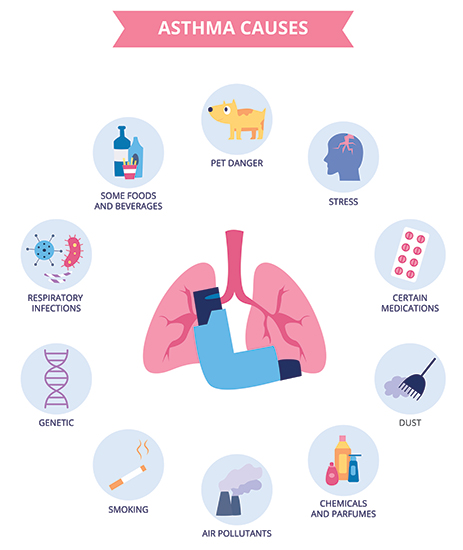Asthma Causes and Risk Factors

Asthma is influenced by a combination of genetic and environmental factors. These can interact in complex ways to increase an individual's susceptibility to the disease. Here are the main causes and risk factors:
-
Genetic Factors: Asthma tends to run in families, suggesting a genetic predisposition. People with a family history of asthma or other allergic conditions, such as atopic dermatitis or hay fever, are at a higher risk of developing asthma.
-
Environmental Factors:
-
Allergens: Exposure to allergens such as pollen, pet dander, mold spores, and dust mites can trigger asthma in susceptible individuals.
-
Air Pollution: Pollutants in the air, including smoke and chemical irritants, can initiate or exacerbate asthma symptoms.
-
Respiratory Infections: Viral and bacterial infections, particularly in childhood, can damage lung tissue and increase the risk of asthma.
-
-
Lifestyle Factors:
-
Smoking: Tobacco smoke is a powerful irritant and can increase the risk of developing asthma. Exposure to secondhand smoke during childhood is particularly harmful.
-
Obesity: Higher body weight can influence respiratory function and inflammation levels in the body, contributing to the development of asthma.
-
-
Occupational Exposures:
Jobs that involve exposure to certain chemicals, dust, or fumes can lead to a specific type of asthma known as occupational asthma.
Understanding these causes and risk factors is crucial for preventing asthma where possible and for managing the condition effectively in those already diagnosed. If you need more detailed information about the causes of asthma or any other related topics, feel free to contact us by phone or e-mail to ask !
Asthma, Impact and Management Strategies
This section delves into asthma’s various impacts on quality of life, triggers that can exacerbate symptoms and the crucial role of caregivers in managing the disease.
Impact on Quality of Life:
Asthma profoundly influences the daily activities and overall quality of life of those affected. The chronic nature of the disease means patients must continually manage its symptoms to maintain normalcy in their lives. Strategies for management are not only medical but also involve significant lifestyle considerations to minimize the disease's impact. For more information click here
Environmental and Personal Triggers:
|
Trigger |
Common Responses |
Management Strategy |
|
Allergens |
Worsening of symptoms like wheezing and coughing |
Avoidance of known allergens, regular cleaning |
|
Cold air |
Increased respiratory distress |
Wearing masks or scarves to warm the air before breathing |
|
Physical activity |
Shortness of breath, fatigue |
Tailored exercise plans with appropriate pre-medication |
|
Smoke |
Irritation of airways, coughing, and wheezing |
Avoiding smoking areas, using air purifiers |
|
Emotional stress |
Heightened symptoms due to stress-induced responses |
Stress management techniques like meditation, proper sleep |
Role of Caregivers:
Caregivers play an indispensable role in the management of asthma. They not only help in the routine administration of medication but also in the identification and avoidance of triggers, and provide emotional support. Their informed and adaptive strategies are crucial for effective disease management, especially in varying daily circumstances that might affect the patient.
Effective asthma management is intricate and dynamic, requiring a tailored approach that addresses the medical, environmental, and emotional dimensions of the disease. Individuals with asthma, along with their caregivers, must be well-informed and proactive in identifying and mitigating potential triggers. Through comprehensive care strategies and ongoing education, asthma patients can achieve better control over their condition, leading to improved health and a higher quality of life. Ultimately, the goal is to empower those affected by asthma to lead healthier and more active lives, minimizing the impact of the condition on their daily activities.
